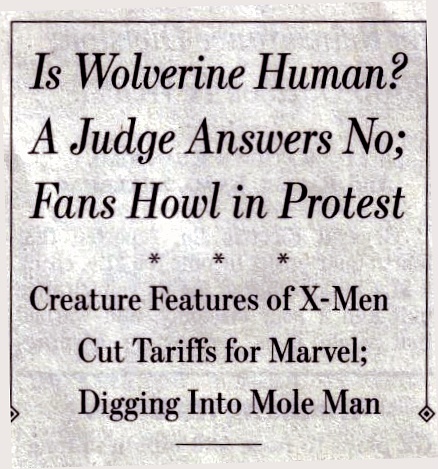Nick Denton of Gawker wonders if the A-hed — the famously quirky front-page story in The Wall Street Journal for the past six decades — is headed for the exit door.
Denton wrote, “This is the front-page feature, once found in the fourth column, now at the base of the third; a home for stories about cooking tips for roadkill or the disappearing holes in Swiss cheese; and the most prized slot in the business newspaper, giving ‘free rein to our reporters’ imagination.’ The Journal’s writers had better save it for the weekend.
 “Robert Thomson (the publisher brought in from the UK by the newspaper’s new owner, Rupert Murdoch) has flown in the paper’s senior editors from its American and international bureaus to break some bad news. Saturday’s weekend edition will get an additional two pages, for features, we’re told. The implication: on busy news days, at the very least, the Journal will no longer run A-Hed features.
“Robert Thomson (the publisher brought in from the UK by the newspaper’s new owner, Rupert Murdoch) has flown in the paper’s senior editors from its American and international bureaus to break some bad news. Saturday’s weekend edition will get an additional two pages, for features, we’re told. The implication: on busy news days, at the very least, the Journal will no longer run A-Hed features.
“This isn’t wholly surprising. The News Corporation boss has already indicated he wants to take on the New York Times in national news. And some sharp-eyed observers such as Ben Compaine had noted how heavily the Journal covered the news surrounding assassination of Benazir Bhutto, a story it might have left to other less detached newspapers in the past.”
Read more here.
The story became known as the A-hed because of the shape of the headline. The first A-hed appeared on Dec. 17, 1941, and it discussed an unforeseen result of the country’s entry into World War II — a shortage of American flags.
Former editor Barney Kilgore created an editing staff for the front page of The Journal whose job it was to make everything that the reader saw first that day appealing. Bill Kerby, who had been put in charge of the front page by Kilgore, said his boss called it ‘our showcase.’
Kerby wanted sharp, clever writing that enticed the reader into the story. So stories began with lead sentences such as, ‘Do you like potato juice? You’ll learn to love it in the days ahead.’ The story was about an impending ban on alcoholic beverages with grain due to a World War II shortage.
The A-hed article provided a break between the two hard news stories, although it often dealt with serious issues. Once, the A-hed featured a story about efforts to save a sea otter smeared with oil in the wake of the 1989 Exxon Valdez oil spill off the Alaska coast.
Another discussed the personal problems that faced Boston Red Sox first baseman Bill Buckner, whose error in the 1986 World Series was blamed for the team losing the sporting event.
OLD Media Moves
The beginning of the end for the WSJ’s A-hed?
January 15, 2008
Posted by Chris Roush
Nick Denton of Gawker wonders if the A-hed — the famously quirky front-page story in The Wall Street Journal for the past six decades — is headed for the exit door.
Denton wrote, “This is the front-page feature, once found in the fourth column, now at the base of the third; a home for stories about cooking tips for roadkill or the disappearing holes in Swiss cheese; and the most prized slot in the business newspaper, giving ‘free rein to our reporters’ imagination.’ The Journal’s writers had better save it for the weekend.
“This isn’t wholly surprising. The News Corporation boss has already indicated he wants to take on the New York Times in national news. And some sharp-eyed observers such as Ben Compaine had noted how heavily the Journal covered the news surrounding assassination of Benazir Bhutto, a story it might have left to other less detached newspapers in the past.”
Read more here.
The story became known as the A-hed because of the shape of the headline. The first A-hed appeared on Dec. 17, 1941, and it discussed an unforeseen result of the country’s entry into World War II — a shortage of American flags.
Former editor Barney Kilgore created an editing staff for the front page of The Journal whose job it was to make everything that the reader saw first that day appealing. Bill Kerby, who had been put in charge of the front page by Kilgore, said his boss called it ‘our showcase.’
Kerby wanted sharp, clever writing that enticed the reader into the story. So stories began with lead sentences such as, ‘Do you like potato juice? You’ll learn to love it in the days ahead.’ The story was about an impending ban on alcoholic beverages with grain due to a World War II shortage.
The A-hed article provided a break between the two hard news stories, although it often dealt with serious issues. Once, the A-hed featured a story about efforts to save a sea otter smeared with oil in the wake of the 1989 Exxon Valdez oil spill off the Alaska coast.
Another discussed the personal problems that faced Boston Red Sox first baseman Bill Buckner, whose error in the 1986 World Series was blamed for the team losing the sporting event.
Media News
Kudlow to remain at Fox Business
November 16, 2024
Media News
Wired senior writer Meaker is departing
November 15, 2024
Media News
CNBC’s head of events departing after 28 years
November 15, 2024
Media News
WSJ taps Beaudette to oversee business, finance and economy
November 15, 2024
Media News
NY Times taps Searcey to cover wealth and power
November 15, 2024
Subscribe to TBN
Receive updates about new stories in the industry daily or weekly.